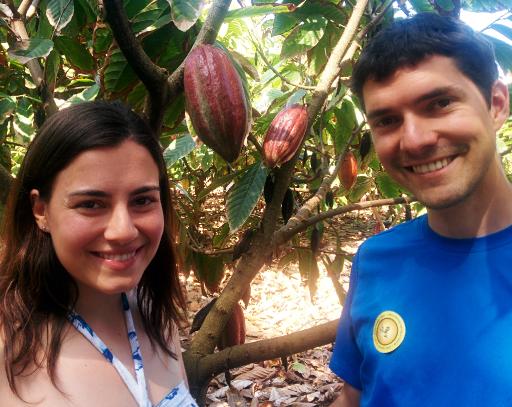
Recently Rated:
Shout outs to SPAGnVOLA and Askinosie in today's Root Chocolate post...
Most chocolate consumers dont consider where their chocolate is coming from. Those of you reading this blog are already ahead of your peers, because youre educating yourself about the process, about what it takes to bring those tasty bars of chocolate to your tongue.
Even then, the majorityof what Ive covered so far involves the processing end of chocolate, once its considered cocoa. However, theres a whole world of chocolate that occurs before the beans are hard and dry. Thats the world of the cacao farmers. Ive discussed the importance of knowing the supply chain of your food, and the concept of slow food . Its also important to consider the individuals who plant the cacao trees, cut down the cacao pods, and open them up to ferment and dry the cacao beans.
Read more here: http://rootchocolate.com/2014/10/09/cacao_farmers/
Recently, I had the opportunity to speak with twotrue chocolate experts. The first was Chloe Doutre-Roussel, author of The Chocolate Connoisseur . We sat at Dandelion in San Francisco, where she was doing a book signing on her way up to the Northwest Chocolate Festival lastweekend.
The second expert was Tad Van Leer. Ill go into detail about my conversation with Mr. Van Leer I learned a lot!
Read more on the Root Chocolate blog:
You may be wondering when were going to get on with making this delicious hobby into a business. Well, were not quite there yet, but Ill shareone option were considering: the CFO or Cottage Food Operation.
First of all, to operate a food business is no easy task, particularly in thislitigious society of ours where McDonalds needs to label coffee as hot andNytol has to label sleeping tablets with may cause drowsiness . There are quite a few licenses and permits and certifications required before one is legally able to sell food in the United States, and in our case, in San Mateo County, California. Specifically, the ability to make and sell food from a home kitchen raised enough interest that California passed a law that went into effect January 1, 2013, called the California Homemade Food Act .
Read more on the Root Chocolate blog:
One of the implications of wanting to partner directly with cacao farmers is learning how to import cocoa beans.
My first ever post on The Chocolate Life was a naive call for small-scale farmers to send me their beans. Little did I know that one of the biggest hurdles to starting a from the bean chocolate business is obtaining high quality, well-fermented cocoa beans! And collaboration is the best way to a successful importation process.
Read more here: http://rootchocolate.com/2014/09/25/importing_cocoa_beans/
At Root Chocolate, we've learned a lot since our first batch of chocolate and are starting to churn out more professional chocolate. However, we love the accessibility of our first recipe and its simplicity. Learn more about the biggest difference between our first and most recent batch, and what we have to say about keeping chocolate-making accessible!
A better, cleaner and fairer world begins with what we put on our plates and our daily choices determine the future of the environment, economy and society. Slow Food USA
This is so relevant to those of us who make chocolate at home and who take the time to create chocolate from the bean. Read more on the blog:
